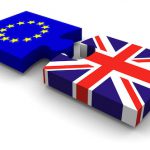The recent vote to “Brexit” the European Union in Great Britain has provided an opportunity to cast light on the hypocrisy of one side and the irony of the other. The “leave” (pro-Brexit) camp taps into the natural human disdain of involuntary control. From willful toddlers to headstrong teenagers to entrepreneurs – no one likes being told what to do. This instinct is normal and natural. The problem occurs when one conflates ones own sovereignty with the sovereignty of the “my”, e.g. my town, my city, my state, my country. People erroneously view this “regional sovereignty” through the lens of a primitive territorial instinct that says everything I can see is “mine”. This territoriality or regionalism is hypocritical at its best and downright evil at its worst. Regionalism purports to trump the sovereignty of the individual by placing the interests of the collective above those of the individual. In short, the many tell the few what they may or may not do. Now, were these constraints restricted to bans on murder, theft, and rape there would be no complaints. But it does not stop there. The regional collective (city, county, district, state, nation, or treaty union) dictates rules over every minutiae of life.
Every nation-state that seeks independence is guilty of the deepest hypocrisy, as they invariably see no problem leveling the same type of control on their own smaller political sub-units. So yes, seek independence, but be prepared to give it as well (cough, Northern Ireland, cough, cough).
The stay (pro-EU) camp is actually host to two types of irony. The first is the credulous acceptance that a large bureaucratic body is needed to achieve an end (free trade) that could also be achieved were each member state to simply do nothing to interfere with the free movement of goods. Which is easier: employ a thousand men to drain the lake you are sitting in so that you might be dry, or, simply get out of the lake?
The second irony pertains to their secondary goal – human unity. The Centralizers (anywhere) believe they are an enlightened sort whose high-minded goals of inclusiveness, equality, and community stand in opposition to backwards notions of nationalism or individualism. This conceit leaves them blind to the fact that centralization is itself inimical to their desired goals.
Forcing people together into larger autarkic unions strengthens those unions in a way that leaves them more capable of waging war (indeed, Turkey shot down a Russian jet last year knowing full well the EU would back it up in a potential Turkish-Russian conflict). Numerous, small groups are too weak to do this. Their interdependence through trade guarantees peace; the hand and the arm need each other, it would be folly for one to destroy the other. Counter intuitively; the freest individual is likewise the most dependent individual. No man is an island, as they say. We rely on our fellow man, through trade, to provide all that we need. Large trade unions like the EU or NAFTA are superfluous. Trade is the lifeblood of human civilization and existed long before such pan-national agreements. Indeed these agreements, rather than “freeing” trade instead manage it – to the benefit of the political and economic elites within each territory. They transform former explicit trade barriers into new regulations. These regulations stifle trade and growth by extinguishing the entrepreneurial flame before it has a chance to flourish. The EU has 109 regulations governing pillows; Europe is in economic decline. Coincidence?
Centralization foments a unique kind of conflict. Not allowing or creating barriers to leaving the union can do nothing but foster resentment. In the past (and present) it has lead to wars. Fortunately today in the case of Brexit it has only risen to the level of schoolyard insults. Heaping ultimatums or derision on the party attempting to leave (as many in the EU are now doing to Britain) smacks of the sour grapes hurled by a jilted partner when a romantic relationship ends: “hey baby, you’re nothing without me!”
Decentralization of authority achieves the goals of peace, prosperity, and equality because it depends on trade. Two people that but for ideological or religious reasons would never have cause to interact are more than willing to ignore those differences and engage in the “just business” of trade. Once a trade relationship is established, a human relationship will soon follow. Trade humanizes the foreigner, stripping away their “other group” title leaving behind only the person. Trade then has the power to expand both our wealth in things and in each other.
The path to uniting humanity is more, not fewer, groups. We should be promoting the break up of states, not their mergers. If all countries could dispense with this Trumpian siege mentality that implies a country can’t be “great” unless it is also autarkic, the world could achieve the peaceful utopia that the one-world centralizers dream of. Spontaneous order works in Nature. We are a part of Nature. It will work for us as well if we can make the right choice to the only question that matters: shall our relationships be governed by force or choice?

The same argument could be made for political parties……..